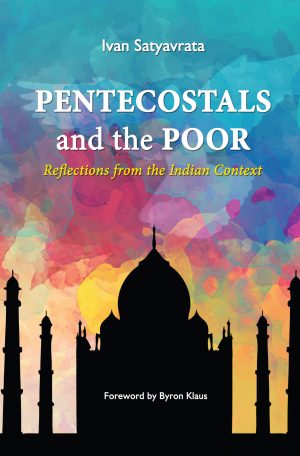Pentecostals and the Poor began to take shape when the Asia Pacific Theological Association invited Ivan Satyavrata to present four lectures on the theme, “Power, Tradition, and Social Engagement,” at its fall 2011 General Assembly in Chiang Mai, Thailand. Satyavrata reworked those lectures into the resulting monograph, the inaugural volume in The APTS Press Occasional Papers Series. It outlines the author’s mature reflections on four topics: (1) the Pentecostal tradition of social engagement, (2) the biblical perspective on Pentecost and mission, (3) a Pentecostal theology of social engagement, and (4) the role of Pentecostal theological education.
Satyavrata is, in the words of his publisher’s website, “Senior Pastor of the Assembly of God Church in Kolkata, which has close to 4,000 people and a significant social outreach, providing education and basic nutrition for several thousand children in and around the city of Kolkata. He has played an active role in Christian leadership training as President of the Centre for Global Leadership Development (formerly SABC), Bangalore, of which he now serves as Board Chairman, and has recently been invited to serve as International Deputy Director for the Lausanne Movement in South Asia. His chief interest has been in issues relating to the Christian witness to people of other faiths.”
Regarding (1), Satyavrata argues that “strictly speaking there is no one Pentecostal tradition; what we do have is multiple Pentecostal traditions which bear a certain family resemblance.” That resemblance centers around “the immediate, manifested presence of the Holy Spirit experienced by the early Church in Acts [which] is normative for the Christian faith community today.” Crucially, social engagement has always been part of that tradition. “Pentecostals today offer not only spiritual refuge from the problems of this world but concrete and authentic social engagement alternatives. They have in fact done so from the very beginning [of Pentecostal history] as a natural extension of their evangelism and missionary efforts.”
Turning to (2), Satyavrata argues that biblically, “the Church’s mission [should be seen] as a continuation of the mission of Jesus.” Jesus’ self-conception revolved around the concept of the kingdom of God. According to Satyavrata, “three crucial aspects of Jesus’ teaching on the kingdom have bearing on our understanding of mission”: (a) announcement of the kingdom’s arrival, (b) demonstration of the kingdom’s reality, and (c) extension of God’s kingdom-rule. Just as the Spirit of God empowered Jesus’ mission, so the Spirit continues to empower the Church’s mission. “Pentecost made the church a witnessing church, and her witness was spontaneous, immediate, effective and directed to ever widening circles of men,” Satyavrata writes.
Based on critical reflection on the biblical witness, Satyavrata arrives at the following conclusion: “A theologically robust Pentecostal understanding of mission thus views mission in terms of God’s ongoing redemptive project of extending his kingdom-rule to people of all nations as the Holy Spirit empowers the whole Church to take the whole gospel to the whole world.”
Flowing out of this broad understanding of mission, Satyavrata then turns to (3) a Pentecostal theology of social engagement. At the outset, he makes the following statements: “The extraordinary success of the Pentecostal movement is largely due to its outreach to those on the periphery of society…. The genius of Pentecostalism has thus been its relevance to the powerless—its ability to penetrate enslaving power structures of the socially and economically marginalized.” American readers need to keep in mind as they read these words that Satyavrata is referring to the global Pentecostal movement, not just the expressions of that movement in America. (American Pentecostals are both like and very unlike Pentecostals throughout the rest of the world.) Satyavrata also notes that Pentecostals “have in general been better at doing it [i.e., social ministry] than articulating it in statements of faith or theological formulations.”
Following on his understanding of mission, Satyavrata notes the relevance of the kingdom concept to the church’s social ethic: “The kingdom ethic of Jesus is made operational within the charismatic community by the empowerment of the Holy Spirit and becomes thereafter the moral foundation for the life of the early church.” He then examines “how Pentecostal spirituality shapes Pentecostalism’s social response” by looking at five key features of that spirituality: prayer/worship, liberation, healing, community, and hope.
In the final section of his monograph, Satyavrata sketches (4) the role of Pentecostal theological education in mission. He defines theological education as “the Church’s mandate to disciple God’s people, further their growth in vocational giftedness and maturity in Christ, and thus equip them to fulfill the kingdom-mission of Christ.” This means that the aim of theological education is transformation holistically understood, including the transformation of (a) spiritual passion, (b) theological formation, (c) community, and (d) mission. He concludes: “Since education is for mission it must generate creative and fervent missionary engagement and make a difference in the whole world!”
Pentecostals and the Poor is a short, easily digested monograph worthy of your consideration. Although its origins lie in an academic context, its reasoning and conclusions are stated clearly and is well worth reading by pastors and other leaders in local churches.
(Full disclosure: he Satyavrata is a professor and friend of mine.
Book Reviewed
Ivan Satyavrata, Pentecostals and the Poor: Reflections from the Indian Context (Eugene, OR: Wipf and Stock, 2017).
P.S. If you liked my review, please click “Helpful” on my Amazon review page.

